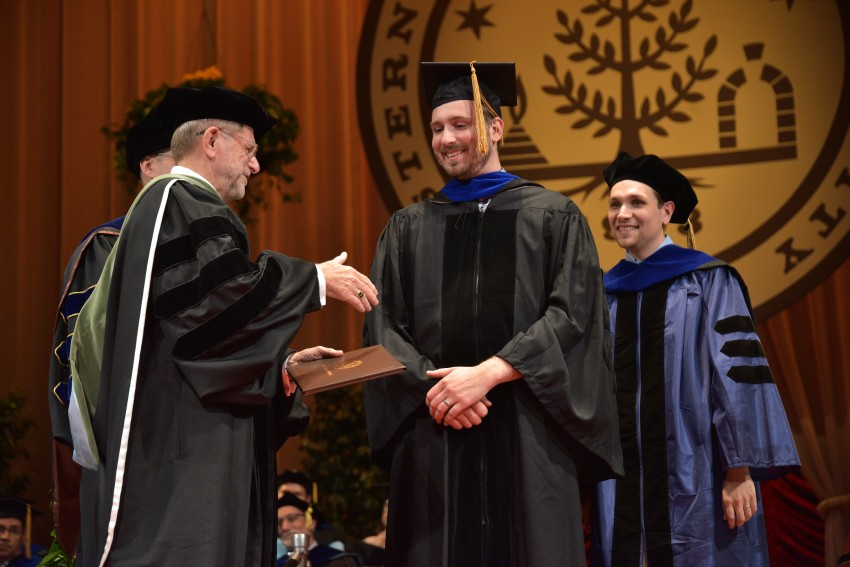The Doctor of Philosophy (PhD), a coveted academic credential, signifies expertise in a specific field. Earning a PhD is no easy feat, requiring years of dedicated research and rigorous study. But what’s the latest news surrounding PhD programs? Are there new trends or challenges facing doctoral students? Let’s delve into some of the most common questions people are asking about PhDs.

Earning a PhD in the Age of Innovation
Techies Awarded PhDs in Unconventional Fields: Traditionally, PhDs were associated with fields like science, literature, and history. However, a recent trend sees universities awarding PhDs in fields like computer science and engineering to individuals with strong technical backgrounds. For instance, a recent news article highlighted a tech professional receiving a PhD in Sanskrit from a university in India [1]. This signifies a growing recognition of the research potential within technical fields.
New Approaches to PhD Admissions: Universities are re-evaluating traditional entrance exams for PhD programs. News from Jawaharlal Nehru University (JNU) in India suggests a shift towards accepting scores from the National Eligibility Test (NET) instead of conducting their own entrance exams [1]. This could streamline the application process for aspiring PhD students.
Alternative Routes to a PhD: The path to a PhD isn’t always linear. News from the Indian Institute of Management Ahmedabad (IIMA) showcased a visually impaired scholar earning a PhD and joining the faculty at IIM Bodh Gaya [1]. This is a testament to the growing inclusivity within PhD programs, encouraging diverse applications from qualified individuals.
Honorary Doctorates in the Spotlight: Universities continue to award honorary doctorates (honoris causa) to recognize significant contributions to society. News from India reported Deputy CM Devendra Fadnavis receiving a PhD from a Japanese university for his work on “Maharashtra at 75” [1]. These awards acknowledge the impact of individuals beyond traditional academic achievements.
Funding for PhD Programs: A Growing Concern
Financial Support for PhD Students: Affordability remains a major concern for many aspiring PhD students. Securing funding through scholarships, fellowships, or research assistantships is crucial. However, news outlets haven’t reported significant advancements in financial aid programs specifically for PhD students. This highlights the need for universities and funding agencies to address the financial challenges faced by doctoral students.
Alternative Funding Models: With limited traditional funding options, some PhD students are exploring alternative avenues. Crowdfunding platforms could potentially offer financial support, but ethical considerations and transparency are paramount. Additionally, some universities might allow for part-time PhD programs, catering to students who need to maintain employment while pursuing their studies.
The Evolving Landscape of PhD Programs
Interdisciplinary Research on the Rise: The boundaries between disciplines are blurring. Universities are increasingly encouraging interdisciplinary research, where PhD students combine expertise from different fields to tackle complex problems. This approach can lead to groundbreaking discoveries and requires collaboration across departments.
Focus on Skills Development: While deep subject knowledge remains essential, PhD programs are now placing greater emphasis on transferable skills. These skills, such as communication, critical thinking, and project management, are valuable in both academic and non-academic settings. Workshops and training programs can equip PhD students with these crucial skills.
The Growing Importance of Public Engagement: PhD research shouldn’t exist in an ivory tower. News from the Department of Philosophy at Madras Christian College in India highlights a workshop on “Ancient Wisdom: Yoga for Mental Health and Well Being” open to the public [2]. This signifies a growing trend toward public engagement, where PhD students share their research findings with the wider community.
Is a PhD Right for You?
Considering a PhD program? Here are some crucial questions to ask yourself:
Do you have a strong passion for a specific field? A PhD requires dedication and perseverance. Genuine interest in your research area is vital.
Are you comfortable with independent research? PhD programs emphasize independent research, with professors acting as mentors rather than instructors.
Are you prepared for the time commitment? Earning a PhD typically takes several years, demanding significant time investment.
Alternatives to a PhD: If a full-fledged PhD seems daunting, consider alternative options:
Master’s degree: A master’s degree offers advanced study in a specific field, often requiring less time and financial investment than a PhD.
Professional degrees: If you’re aiming for a career in a specific field like law or medicine, a professional degree might be a better fit.
Research positions: Some research institutions offer research positions that don’t require a PhD but allow you to gain valuable research experience.

FAQ’S
Q: What’s the latest buzz on PhD admissions?
A: There are a few interesting trends. Several universities are considering replacing their own entrance exams for PhD programs with national eligibility tests, streamlining the application process [1]. This could be good news for potential students, reducing the number of exams required. Additionally, a recent story highlighted a visually impaired scholar earning a PhD at a prestigious Indian institute, showcasing the growing focus on inclusivity in academia [1].
Q: Are there any recent achievements worth mentioning?
A: Absolutely! From inspiring stories of perseverance to groundbreaking research, there’s always something newsworthy. A visually impaired scholar earning a PhD at the Indian Institute of Management Ahmedabad (IIM-A) is a testament to dedication and the institute’s commitment to diversity [1]. In another story, Deputy Chief Minister Devendra Fadnavis of Maharashtra, India, received a PhD from a Japanese university, highlighting the pursuit of knowledge across political careers [1].
Q: I’ve heard about honorary doctorates. What’s the deal with those?
A: Honorary doctorates (honoris causa) are prestigious awards bestowed upon individuals who have made significant contributions to their field or society. These are not earned through traditional PhD programs. Recently, Dr. Bina Modi, chairperson of Modi Enterprises, was conferred an honorary PhD for her impactful work [5].
Q: Is there anything new happening in the world of philosophy itself?
A: While not strictly “PhD news,” there are always interesting events related to philosophy. For instance, the Department of Philosophy at Madras Christian College in India recently organized a workshop on “Ancient Wisdom: Yoga for Mental Health and Well Being” [3]. This highlights the ongoing exploration of philosophy’s practical applications in our lives.
Q: Beyond these specific examples, what other PhD-related news might I find interesting?
A: There’s a lot to explore! Here are some areas to consider:
Funding opportunities: Many universities and research institutions offer fellowships and scholarships to support PhD students. Staying updated on these funding options can be crucial for financing your studies.
Research breakthroughs: Many PhD programs culminate in groundbreaking research that impacts various fields. Following news related to your specific area of interest can keep you informed about the latest advancements.
Policy changes: Government policies and university regulations can affect PhD programs. Staying informed about these changes can help with your application and overall experience.
Q: Where can I find reliable sources for PhD news?
A: Excellent question! Here are some suggestions:
University websites: Many universities have dedicated sections for their PhD programs and research news.
Academic journals and publications: These often feature articles on research advancements and the state of PhD programs in specific fields.
News websites: Major news outlets and education-focused websites often cover stories related to PhD admissions, achievements, and trends.
Social media: Professional organizations and universities may use social media platforms like Twitter and LinkedIn to share PhD-related news and updates.
To read more, Click here